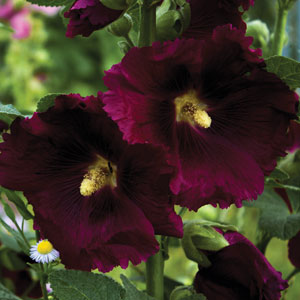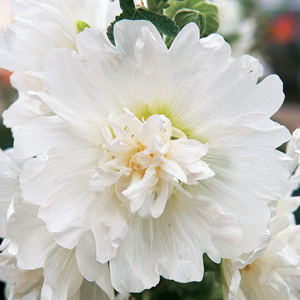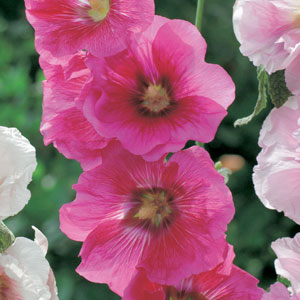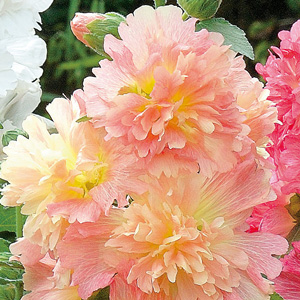Hollyhock Growing Guide

What is Hollyhock?
Hollyhock (Alcea rosea) is a herbaceous biennial and is a staple of a cottage garden. It is part of the Malvaceae family and is native to the Middle East. Hollyhock have rounded, lobed leaves that grow all along the strong stems. They flower in their second year before setting seed for the next generation of plants. The flowers form in Summer as tall racemes where each individual flower is a large funnel or pompom shape depending on variety. Hollyhock flowers come in two variety’s as either single or doubles. Flower colours range from whites, reds, pinks, crimsons, rose, yellow and white with the added bonus of a very dark purple to black in the single flower. Hollyhocks prefer a full sun position in the garden that is protected from strong winds. They are drought tolerant once established.
Benefits of Growing Hollyhock
Hollyhocks are a traditional favourite in cottage gardens. They make the perfect tall colourful backdrop to a border or bed. Hollyhocks are quite frost hardy and drought tolerant. They are a magnet for bees and butterflies and are also easy to grow.
How to Grow Hollyhock
Climatic Zones
Cool, temperate, arid, semi arid.
Plant Size
Normal Height: 1.5-2m, Width: 60cm
Dwarf Height: 60-75cm, Width: 20-30cm
When To Plant Hollyhock
Plant in Late Winter to early Spring. If growing as seed sow in Autumn or Winter.
Soil Preparation
They need moist rich, well drained soil. Mix through compost or well broken down animal manure to your soil before planting.
How To Plant Hollyhock
Plant in full sun, with the plant crown at soil level. Spacing will depend on variety.
Hollyhock Plant Care
Water generously during dry periods and periods of growth. Water at the base of the plant to avoid fungal diseases.
Fertilise with a complete or general fertliser. They are heavy feeders, so feed well.
Remove spent flowers to encourage further blooms. Cut back foliage when plant goes into first year dormancy.
Stake the tall flowers when in a windy position.
Watch out for snails and slugs. They are susceptible to rust. Remove affected leaves.
Recommended Hollyhock Varieties
Bring large hits of colour with this old time favourite.










